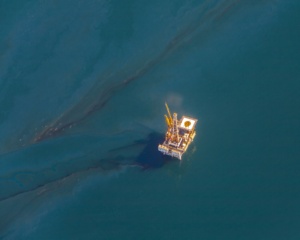On September 24th, nine members of the U.S. House of Representatives, including Representative Salud Carbajal, filed a brief in support of appeals filed by the Environmental Defense Center (“EDC”) and Santa Barbara Channelkeeper (“SBCK”), the State of California, and other environmental groups, in their case challenging federal government agencies’ approval of offshore fracking and acidizing. The brief, which was filed in the U.S. Court of Appeals for the Ninth Circuit, explains why the federal government should have conducted a thorough environmental review before approving such activities.

In June 2019, EDC and SBCK appealed to the Ninth Circuit to defend their November 2018 court victory that currently prohibits the use of fracking and acidizing offshore California, and to seek full environmental review of the impacts of these dangerous practices on the local environment, including harm to wildlife and air and water quality. Acidizing and fracking are both potentially dangerous oil production processes involving the injection of large amounts of water and chemicals below the seafloor in order to fracture or dissolve rock. Much of the fracking and acidizing that has been conducted offshore California has been done in the Santa Barbara Channel. The Channel’s biological diversity is so rich that the area has been called “North America’s Galapagos,” and the area harbors numerous threatened and endangered species, including blue, fin, and humpback whales, and the southern sea other. Not only does the Channel provide excellent opportunities for fisheries, tourism, and other recreation, it also includes the Channel Islands National Marine Sanctuary and Park, as well as federal and state Marine Protected Areas. It is also our home, and the site of some of the most beloved and ecologically important coastal open space left in the country.
The case is fully briefed by the parties and scheduled for oral argument in court on October 18, 2021. Today, members of the U.S. House of Representatives weighed in as “Amici Curiae” or “friends of the Court” to register their and their constituents’ concerns about the impacts of these dangerous practices and the failure of federal government agencies to conduct full environmental review before issuing permits to companies like ExxonMobil, Venoco, Inc, and others.
“Santa Barbara knows all too well how devastating an oil spill can be to marine life and to our local economy. In fact, the 1969 Santa Barbara Oil Spill served as a catalyst for the environmentalist movement and led to the creation of the National Environmental Policy Act (NEPA). We cannot repeat the mistakes of the past,” said Rep. Carbajal. “I am proud to support the Environmental Defense Center’s lawsuit calling on our federal agencies to complete the research necessary to understand the potential impact fracking would have on our ocean and community. Allowing federal agencies to rush through this process would set a dangerous precedent.”
“This input from members of the U.S. House of Representatives underscores the significant and potentially devastating threats that offshore fracking and acidizing poses to the sensitive Santa Barbara Channel region,” said Maggie Hall, Senior Attorney at EDC. “We are committed to ensuring the federal government fully discloses the impacts of these practices.”
“The impacts of offshore fracking and acidizing on local wildlife have never been meaningfully analyzed,” said Ted Morton, Executive Director of SBCK. “These practices will extend the life of existing oil platforms in a sensitive marine environment which is still recovering from the 2015 Plains All American Pipeline rupture that devastated our coastline. We need information to understand the potential impacts of these practices so that appropriate measures can be implemented to protect marine life, our coast, our communities, and our economy.”
The Congress members’ brief asserts that the federal agencies’ existing analysis is “in no way sufficient to analyze the potential risks [well stimulation treatments] pose, or to meet the fundamental requirements of [the National Environmental Policy Act (“NEPA”)] for the agencies to take a ‘hard look’ at the environmental consequences of their actions.” They stress the uniqueness and sensitivity of the Santa Barbara Channel region; its history of catastrophic oil spills; the substantial controversy that exists over the effects of these practices; and the adverse impacts of these practices on federally-protected species, which includes the threatened Southern sea otter and Western snowy plover. For all of these reasons, the brief states that further environmental review is necessary. The members are concerned “over the precedent that could be set by failing to apply NEPA where it is so clearly triggered, and the risk this decision poses to the Santa Barbara Channel and their constituents who reside, work, and recreate in the region.”
In November 2018, a federal District Court judge ruled in favor of EDC and SBCK in part, prohibiting the federal government from approving fracking and acidizing offshore California until the U.S. Fish and Wildlife Service and California Coastal Commission have the opportunity to review such practices. However, the court declined to require additional environmental review of these practices under NEPA—the law the U.S. House of Representatives and environmental groups say clearly requires preparation of an Environmental Impact Statement in this case. The organizations’ appeal seeks to uphold the current injunction on offshore fracking and acidizing and require full environmental analysis.
More information on fracking and acidizing can be found in EDC’s Dirty Water: Fracking Offshore California report.
The full list of members of the U.S. House of Representatives that filed the brief includes:
Rep. Salud Carbajal
Representative of California (CA-24)
Rep. Julia Brownley
Representative of California (CA-26); Member, House Committee on Natural Resources
Rep. Jared Huffman
Representative of California (CA-2); Member, House Committee on Natural Resources
Rep. Doris Matsui (CA-6)
Representative of California (CA-6); Member House Committee on Energy & Commerce
Rep. Barbara Lee
Representative of California (CA-13); Member, House Appropriations Committee
Rep. Grace Napolitano
Representative of California (CA-32); Member, House Committee on Natural Resources
Rep. Nanette Barragán
Representative of California (CA-44); Member, House Committee on Energy & Commerce
Rep. Matt Cartwright
Representative of Pennsylvania (PA-8); Member, House Appropriations Committee
Rep. Steve Cohen
Representative of Tennessee (TN-9); Member, House Committee on Natural Resources
